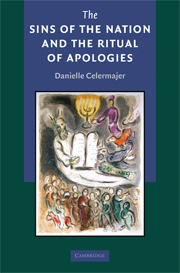Book contents
- Frontmatter
- Contents
- Acknowledgements
- Introduction: The Apology and Political Theory
- 1 The Apology Phenomenon
- 2 Apologies as Speech Acts
- 3 Judaism's Apology: Reconstituting the Community
- 4 The Privatization of Repentance in Christianity
- 5 Australia's Divided History
- 6 Saying Sorry in Australia
- 7 Apology's Responsibility
- 8 Apology as Political Action
- Bibliography
- Index
4 - The Privatization of Repentance in Christianity
Published online by Cambridge University Press: 27 July 2009
- Frontmatter
- Contents
- Acknowledgements
- Introduction: The Apology and Political Theory
- 1 The Apology Phenomenon
- 2 Apologies as Speech Acts
- 3 Judaism's Apology: Reconstituting the Community
- 4 The Privatization of Repentance in Christianity
- 5 Australia's Divided History
- 6 Saying Sorry in Australia
- 7 Apology's Responsibility
- 8 Apology as Political Action
- Bibliography
- Index
Summary
The focus … shifted from the well being of the community and the reintegration of penitent sinners to enabling sinners to make satisfaction for their sins and experience forgiveness. The ministry was less and less perceived as community ministry – the ministry of the community to penitent sinners with the goal of restoring the integrity of the community – and instead regarded as an individual ministry of the priest or spiritual expert for the sinner who sought healing.
James DallenIn line with the commonly held image of Christianity as a religion emphasizing an individual's salvation relationship with God, one usually thinks of the Christian model of repentance as essentially individual and private. The communal and collective dimensions that remained central in Jewish understanding and practice seem alien in concept and absent in practice. It is almost inconceivable to us that, in fact, the corporate model is not so remote from Christianity at all, but lies at the heart of early Christian practices and understanding, and indeed remains a central form of religious practice and understanding in some churches. This is, however, no innocent invisibility, but rather the product of the triumph of the individual form. If we cannot see the collective apology in Christian practice or theology, that is because it has been overshadowed by the dominating image of the individual, privately murmuring his or her sins in the darkness of the confessional, sanctioned by Trent, and immortalized by a historical erasure of the fact that any other form existed.
- Type
- Chapter
- Information
- The Sins of the Nation and the Ritual of Apologies , pp. 108 - 141Publisher: Cambridge University PressPrint publication year: 2009



